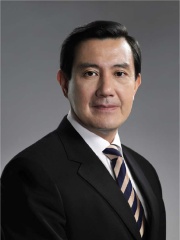
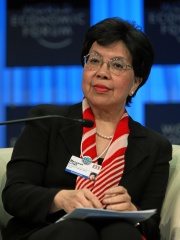
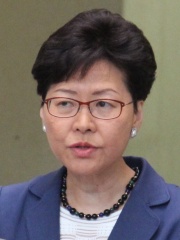
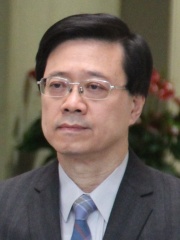
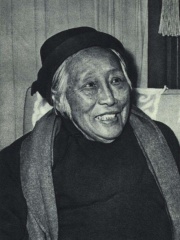
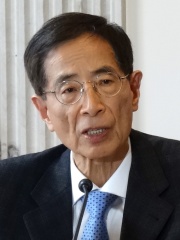

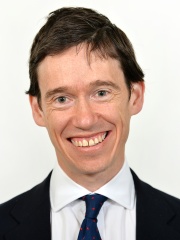
The Most Famous
POLITICIANS from Hong Kong
This page contains a list of the greatest Chinese Politicians. The pantheon dataset contains 19,576 Politicians, 9 of which were born in Hong Kong. This makes Hong Kong the birth place of the 164th most number of Politicians behind Mauritius, and Togo.
Top 9
The following people are considered by Pantheon to be the most legendary Chinese Politicians of all time. This list of famous Chinese Politicians is sorted by HPI (Historical Popularity Index), a metric that aggregates information on a biography's online popularity.

1. Ma Ying-jeou (b. 1950)
With an HPI of 68.28, Ma Ying-jeou is the most famous Chinese Politician. His biography has been translated into 60 different languages on wikipedia.
Ma Ying-jeou (Chinese: 馬英九; pinyin: Mǎ Yīngjiǔ; Ma-ING-gee-oh; born 13 July 1950) is a Taiwanese politician, lawyer, and legal scholar who served as the sixth president of the Republic of China from 2008 to 2016. A member of the Kuomintang (KMT), he was previously the mayor of Taipei from 1998 to 2006 and the chairman of the Kuomintang for two terms (2005–2007; 2009–2014). Ma was born in British Hong Kong to a prominent waishengren family. After graduating from National Taiwan University in 1972, he served in the Republic of China Marine Corps and attained the rank of lieutenant. He then studied law in the United States, earning a master's degree from New York University in 1976 and his doctorate from Harvard University in 1981, both in international law. Ma began his political career as a bureau director and English translator for President Chiang Ching-kuo. From 1988 to 1996, he held office first as chair of the Research, Development and Evaluation Commission, becoming the youngest cabinet member at age 38, and then as head of the Ministry of Justice, where he launched anti-corruption and anti-drug campaigns. In the 1998 Taipei mayoral election, he successfully ran against incumbent Chen Shui-bian of the Democratic Progressive Party (DPP). During his mayoralty, he was elected as KMT chairman in 2005 and announced his candidacy in the 2008 Taiwanese presidential election, eventually defeating DPP nominee Frank Hsieh in a landslide majority. Ma's presidency was defined by closer cross-strait relations with mainland China. He initiated a series of cross-strait summits (2008–2015), was elected again as party chairman in 2009, and signed the Economic Cooperation Framework Agreement with the People's Republic of China (PRC) in 2010. After defeating Tsai Ing-wen and being reelected in 2012, his second term saw the September 2013 power struggle and the Sunflower Student Movement protests damage party reputation in the 2014 elections, leading to his resignation as KMT chair. Subsequently, he held the 2015 Ma–Xi meeting in Singapore, marking the first meeting between the leaders of the PRC and ROC since the Chinese Civil War. After leaving the presidency in 2016, Ma became a law professor at Soochow University and has remained active in KMT politics.

2. Margaret Chan (b. 1947)
With an HPI of 65.64, Margaret Chan is the 2nd most famous Chinese Politician. Her biography has been translated into 34 different languages.
Margaret Chan Fung Fu-chun (born 21 August 1947) is a Chinese-Canadian physician and politician, who served as the Director-General of the World Health Organization (WHO) delegating the People's Republic of China from 2006 to 2017. Chan previously served as Director of Health in the Hong Kong Government (1994–2003) and representative of the WHO Director-General for Pandemic Influenza and WHO Assistant Director-General for Communicable Diseases (2003–2006). In 2014, Forbes ranked her as the 30th most powerful woman in the world. In early 2018 she joined the Chinese People's Political Consultative Conference (CPPCC). She was widely criticized for her handling of the 1997 H5N1 avian influenza outbreak and the 2003 SARS outbreak in Hong Kong, and for her frequent travels while serving as Director-General of the WHO.

3. Carrie Lam (b. 1957)
With an HPI of 61.59, Carrie Lam is the 3rd most famous Chinese Politician. Her biography has been translated into 51 different languages.
Carrie Lam Cheng Yuet-ngor (née Cheng; Chinese: 林鄭月娥; Cantonese Yale: Làhm Jehng Yuht-ngòh; born 13 May 1957) is a retired Hong Kong politician who served as the fourth Chief Executive of Hong Kong from 2017 to 2022, after serving as Chief Secretary for Administration for five years. After graduating from the University of Hong Kong, Lam joined the British Hong Kong civil service in 1980 and served in various government agencies, including as Director of Social Welfare from 2000 to 2004 and Director General of the Hong Kong Economic and Trade Office in London from 2004 to 2006. She became a key official in 2007 when she was appointed Secretary for Development. During her tenure, she earned the nickname "tough fighter" for her role in the controversial demolition of the Queen's Pier in 2008. Lam became Chief Secretary for Administration under the Leung Chun-ying administration in 2012. From 2013 to 2015, Lam headed the task force on the 2014 electoral reform and held talks with student and opposition leaders during the widespread protests. In the 2017 Chief Executive selection process, Lam obtained 777 votes from the 1,194-member appointed Election Committee as the Beijing-favoured candidate and became the first female Chief Executive of Hong Kong. Lam's administration had been marred with a series of controversies and thus relatively unpopular since inauguration. Her government was also criticised for raising the qualification age for social security, the proposed cross-harbour tunnel toll plan, and the historic ban on the pro-independence National Party, among other policies. In mid-2019, Lam pushed for the controversial extradition bill which received widespread domestic and international opposition. Massive protests broke out and persisted throughout the latter half of the year, from demanding the withdrawal of the bill to Lam's resignation among five key demands. Despite suspending the bill in June and eventually withdrawing the bill in September, Lam stood firmly against the other demands including an independent inquiry into police conduct and universal suffrage for legislative and leadership elections. Escalating clashes between protesters and police resulted in at least 10,000 arrests, and would only die down as COVID-19 hit the city. After the pro-government camp suffered a landslide defeat in the 2019 local elections, Lam's popularity further plunged to a record low due to the mishandling of the pandemic. Lam also saw the Chinese Government imposing the national security law in July 2020, criticised for shrinking freedom in the city and silencing the dissidents. Opposition activists are tried and jailed while pro-democracy media were forced to close. In April 2022, Lam announced that she would not seek a second term as Chief Executive, giving her wish to devote more time with her family as an explanation. She was succeeded on 1 July 2022 by hardliner John Lee.

4. John Lee Ka-chiu (b. 1957)
With an HPI of 58.97, John Lee Ka-chiu is the 4th most famous Chinese Politician. His biography has been translated into 22 different languages.
John Lee Ka-chiu (Chinese: 李家超; born 7 December 1957) is a Hong Kong politician and former police officer who is currently the fifth chief executive of Hong Kong since 1 July 2022. Originally a police officer, Lee served as the deputy commissioner of the Hong Kong Police Force from 2010 till 2012, when he was appointed as under secretary of security under the Leung government. After Carrie Lam became chief executive in 2017, Lee was promoted to secretary for security. In 2021, he succeeded Matthew Cheung as chief secretary for administration, a post he served until 2022. Lee was the sole candidate approved by the central government of China in the 2022 Hong Kong Chief Executive election. He was subsequently chosen to succeed Carrie Lam, taking office on 1 July 2022. His selection was seen as a move by the Chinese government to focus further on security and further integrate Hong Kong with mainland China. Cracking down dissent and playing a key role in arresting opposition in the pro-democracy primary election of 2020, he was sanctioned by the first Trump administration through Executive Order 13936 in pursuant to the Hong Kong Autonomy Act of 2020. A pro-Beijing politician, Lee is known as being a hardliner against the pro-democracy camp in Hong Kong, having played a key role in the crackdown of the opposition. He signed the local legislation Safeguarding National Security Ordinance into law in 2024.
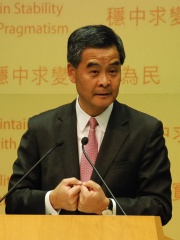
5. Leung Chun-ying (b. 1954)
With an HPI of 56.98, Leung Chun-ying is the 5th most famous Chinese Politician. His biography has been translated into 36 different languages.
Leung Chun-ying (Chinese: 梁振英; born 12 August 1954), also known as CY Leung, is a Hong Kong politician and chartered surveyor who has served as vice-chairman of the National Committee of the Chinese People's Political Consultative Conference since March 2017. He was previously the third Chief Executive of Hong Kong between 2012 and 2017. A surveyor by profession, Leung entered politics when he joined the Hong Kong Basic Law Consultative Committee (HKBLCC) in 1985 and became its secretary-general in 1988. In 1999, he was appointed the convenor of the Executive Council of Hong Kong, a position he held until 2011, when he resigned to run in the 2012 Chief Executive election. Initially regarded as the underdog, Leung ran a successful campaign against front-runner Henry Tang, receiving 689 votes from the Election Committee and with the support of the Liaison Office. At the beginning of his administration, Leung faced the anti-Moral and National Education protests and the Hong Kong Television Network protests. In 2014, Leung's government faced widespread civil disobedience targeting the government's constitutional reform proposals; the movement gained global attention as the "Umbrella Revolution". After the 2014 protests, Leung's government had to deal with the 2016 Mong Kok civil unrest. During his election campaign and governance, Leung also faced allegations related to his receipt of HK$50 million payment by UGL, which prompted initial investigations by the Australian Parliament. Leung's tenure coincided with the rise of social instability, localism in Hong Kong, and an independence movement for Hong Kong's separation from Chinese sovereignty. In December 2016, Leung announced he would not seek a second term, becoming the first Chief Executive not to do so.

6. He Xiangning (1878 - 1972)
With an HPI of 56.16, He Xiangning is the 6th most famous Chinese Politician. Her biography has been translated into 17 different languages.
He Xiangning (Chinese: 何香凝; Wade–Giles: Ho Hsiang-ning; 27 June 1878 – 1 September 1972) was a Chinese revolutionary, feminist, politician, painter, and poet. Together with her husband Liao Zhongkai, she was one of the earliest members of Sun Yat-sen's revolutionary movement Tongmenghui. As Minister for Women's Affairs in Sun's Nationalist government in Guangzhou (Canton), she advocated equal rights for women and organized China's first rally for International Women's Day in 1924. After her husband's assassination in 1925 and Chiang Kai-shek's persecution of the Communists in 1927, she stayed away from party politics for two decades, but actively worked to organize resistance against the Japanese invasion of China. In 1948, she cofounded the Revolutionary Committee of the Chinese Kuomintang. She served in many high-ranking positions after the foundation of the People's Republic of China, including Vice Chairwoman of the CPPCC (1954–64), Vice Chairwoman of the National People's Congress (1959–72), Chairwoman of the Revolutionary Committee of the Chinese Kuomintang (1960–72), and Honorary Chairwoman of the All-China Women's Federation. He Xiangning was a renowned painter of the Lingnan School of Chinese art and served as Chairwoman of the China Artists Association in the 1960s. The National He Xiangning Art Museum was opened in Shenzhen in 1997, and her paintings have been featured on Chinese stamps.

7. Martin Lee (b. 1938)
With an HPI of 56.01, Martin Lee is the 7th most famous Chinese Politician. His biography has been translated into 15 different languages.
Martin Lee Chu-ming (Chinese: 李柱銘; born 8 June 1938) is a Hong Kong politician and barrister. He is the founding chairman of the United Democrats of Hong Kong and its successor, the Democratic Party, Hong Kong's flagship pro-democracy party. He was also a member of the Legislative Council of Hong Kong from 1985 to 1997 and from 1998 to 2008. Nicknamed the "Father of Democracy" in Hong Kong, he is recognised as one of the most prominent advocates for democracy and human rights in Hong Kong and China. A barrister by profession, Lee served as the chairman of the Hong Kong Bar Association from 1980 to 1983. In 1985 he was elected to the Legislative Council, where he advocated strongly for the protection of human rights and democratic reform. He became involved in discussions over Hong Kong's handover to China, and in 1985 he joined the Hong Kong Basic Law Drafting Committee to assist in the drafting of Hong Kong's Basic Law, the city's mini-constitution post-handover. He was, however, expelled from the body in the wake of the 1989 Tiananmen Square protests and massacre, due to his condemnation of the Chinese government and his vocal support for the student protestors. In 1990, he became the founding chairman of the first pro-democracy party in Hong Kong, the United Democrats of Hong Kong, and later its successor, the Democratic Party. Under his leadership, the party won two landslide victories in the direct elections of 1991 and 1995, and emerged as one of the largest political parties in Hong Kong. He worked closely with the last Hong Kong Governor Chris Patten in an attempt to push forward constitutional reform in relation to democratic elections, attracting strong criticism from the Beijing government. In June 1997, he was forced to step down from his office when the colonial legislature was dissolved, alongside a number of other legislators; they later won back their seats in the Legislative Council in 1998. He resigned as the chairman of the Democratic Party in December 2002, and in 2008 he retired as a member of the Legislative Council. Prior to July 2020 he remained active in advocating and lobbying for the democratic cause both locally and internationally. This ended with the passage of the Hong Kong National Security Law on 1 July 2020.

8. Agnes Chow (b. 1996)
With an HPI of 43.38, Agnes Chow is the 8th most famous Chinese Politician. Her biography has been translated into 29 different languages.
Agnes Chow Ting (Chinese: 周庭; born 3 December 1996) is a Hong Kong politician and social activist. She is a former member of the Standing Committee of Demosisto and former spokesperson of Scholarism. Her candidacy for the 2018 Hong Kong Island by-election, supported by the pro-democracy camp, was blocked by authorities, due to her party's advocacy of self-determination for Hong Kong. She was arrested in August 2019, during the 2019–2020 Hong Kong protests, for her role in a protest at police headquarters two months earlier, and sentenced to 10 months in jail in December 2020. She was again arrested for the National Security charge of 'collusion with foreign forces' in August 2020, albeit released on bail the day after. Chow went into exile in Canada in September 2023 to pursue a master’s degree at OCAD University, from which she graduated in 2025.

9. Rory Stewart (b. 1973)
With an HPI of 40.36, Rory Stewart is the 9th most famous Chinese Politician. His biography has been translated into 20 different languages.
Roderick James Nugent "Rory" Stewart (born 3 January 1973) is a British academic, broadcaster, writer, and former diplomat and politician. He teaches and co-directs the Brady-Johnson Program in Grand Strategy at Yale Jackson School of Global Affairs. Since 2022, Stewart has co-hosted the The Rest Is Politics podcast with Alastair Campbell. Stewart served as a British Member of Parliament between 2010 and 2019, and in the British government, between 2015 and 2019. Born in British Hong Kong, Stewart attended the Dragon School and Eton College growing up. After a brief period of military service in Black Watch, Stewart studied philosophy, politics and economics (PPE) at Balliol College, Oxford. After graduating he joined the Foreign Office, holding diplomatic positions in Indonesia and Montenegro. He left the Foreign Office to undertake a solo walk across Asia, which later became the subject of his best-selling book The Places in Between. Following the 2003 invasion of Iraq, Stewart was involved in the Coalition Provisional Authority in the Maysan province. He founded and ran the Turquoise Mountain Foundation, an NGO focused on human development in Afghanistan, before becoming a professor at the Harvard Kennedy School. He joined the Conservative Party in 2009. Stewart served as Member of Parliament (MP) for Penrith and The Border between 2010 and 2019, representing the Conservative Party. In 2014 he was elected chair of the Defence Select Committee. He served under David Cameron as Minister for the Environment from 2015 to 2016. He was a minister throughout Theresa May's government: as Minister of State for International Development, Africa, and Prisons. He joined the Cabinet and National Security Council as Secretary of State for International Development. After May resigned, Stewart stood as a candidate to be Leader of the Conservative Party and Prime Minister of the United Kingdom in the 2019 leadership contest. His campaign was defined by unorthodox use of social media and opposition to a no-deal Brexit. He stated at the beginning of his campaign that he would not serve under Boris Johnson. When Johnson became prime minister in July 2019, Stewart resigned from the cabinet. In September 2019, Stewart had the Conservative Whip removed after voting to delay the UK's exit from the European Union. In October 2019, Stewart resigned from the Conservative Party and stood down as an MP at the 2019 general election. He announced he would stand as an independent in the London mayoral election, but withdrew in May 2020 on the grounds of it being postponed to 2021 due to the COVID pandemic. Stewart was the president of GiveDirectly from 2022 to 2023 and a visiting fellow at Yale Jackson from 2020 to 2022. In 2023 he published a book, Politics on the Edge.
People
Pantheon has 9 people classified as Chinese politicians born between 1878 and 1996. Of these 9, 8 (88.89%) of them are still alive today. The most famous living Chinese politicians include Ma Ying-jeou, Margaret Chan, and Carrie Lam. The most famous deceased Chinese politicians include He Xiangning.
Living Chinese Politicians
Go to all RankingsMa Ying-jeou
1950 - Present
HPI: 68.28
Margaret Chan
1947 - Present
HPI: 65.64
Carrie Lam
1957 - Present
HPI: 61.59
John Lee Ka-chiu
1957 - Present
HPI: 58.97
Leung Chun-ying
1954 - Present
HPI: 56.98
Martin Lee
1938 - Present
HPI: 56.01
Agnes Chow
1996 - Present
HPI: 43.38
Rory Stewart
1973 - Present
HPI: 40.36

